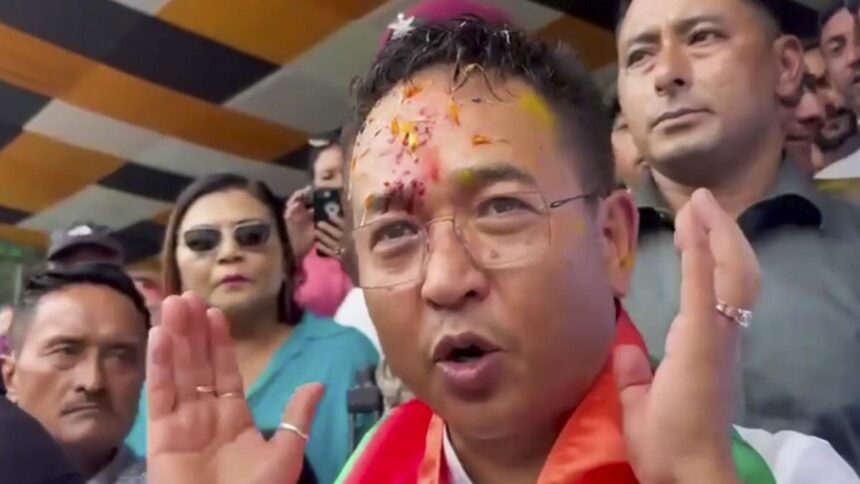[ad_1]

SKM chief Prem Singh Tamang ‘Golay’ celebrates his party’s win in the 2024 Sikkim Assembly elections.
| Photo Credit: PTI
In the landlocked State nestled within the Himalayas in the northeast, Sikkim Krantikari Morcha (SKM) has been rather synonymous with the “winds of change”. The basis of their foundation or their political messaging has always rather been around the same premise. A perusal of their doctrine sees them emphasising “equitable wealth distribution” or “equal prosperity”. As captured in a Frontline report (May 2019), while the Sikkim Democratic Front (SDF) placed themselves with focus on peace, stability and development of their rather long reign, the SKM focused on the anti-incumbency sentiment. This was further backed by allegations of corruption and nepotism within.

With the SKM securing a continued stay at the State’s top administrative office, a deep dive into its origins best reflects the prerogative and the “winds of change” they sought for the State.
The disappointment that created a dissident
In 2013, the now-incumbent Chief Minister of Sikkim Prem Singh Tamang ‘Golay’ left the SDF. What preluded the move was Mr. Golay’s run-ins about favouritism within his erstwhile party. Mr. Golay’s unhappiness with the party and the difficulties he was facing in pursuing “people’s work” was already known. In his resignation letter to then Chief Minister and president Pawan Kumar Chamling, Mr. Golay had sought that the SDF was never the former’s “private intellectual property”. He held that the SDF was formed to support the people against nepotism, communalism and exploitation. “But under your leadership, this party was used as a resource only for you and exploiters and realising the injustice towards poor Sikkimese people, I am writing this resignation letter,” read his resignation letter, as captured in newspapers.
Mr. Golay specifically indicated that the corruption allegations against Mr. Chamling that he had initially dismissed as political allegations had turned otherwise. He pointed to how Mr. Chamling took out a gazette notification to prevent the CBI from entering Sikkim.

Before his eventual exit in 2013, Mr. Golay was the subject of multiple confrontations with the SDF president. In 2014, he went on to contest two seats, namely, Upper Burtuk and Namthang-Rateypani, for the SKM — the party that was founded by his supporters earlier. While the former Minister for Animal Husbandry, Ecclesiastical and Industry Department and an MLA from the same region managed to secure the leadership for the constituency, he lost in the latter.
The SKM would go on to unseat the SDF after a quarter of a century stay in the country’s top administrative office in 2019.
Article 371F and alliances
A common prerogative of parties from northeastern India is to form alliances at the Centre to pursue their own developmental agendas. The SKM has been no different. However, with the focus turning to the much emotive issue concerning Article 371F after the dilution of Article 370 — that led to the reorganisation of the erstwhile state of Jammu and Kashmir — an alliance with the BJP in Delhi would not bode well for their political prospects.
For perspective, Article 371F of the constitution provides a special status to Sikkim. Mr. Golay had stated it was among the key terms for the merger of the State of Sikkim with India in 1975. The second-time Chief Minister also found himself at the receiving end of questions put up by his former SDF chief. Mr. Chamling would point to the Finance Bill, 2023, that redefined ‘Sikkimese’ as any Indian citizen domiciled in Sikkim. He referred to it as a violation of the provisions of the article. In response, Mr. Golay, refuting the charge, stated in a social media post that he was assured by Finance Minister Nirmala Sitharaman that this was done for purposes only relating to income tax exemption with the original definition being respected.
The question first propped up in the run-up to the Legislative Assembly elections of 2019. The option was initially considered but could not find a conclusive end. However, with the same consideration described previously, the SKM would go on to join the National Democratic Alliance (NDA). Eventually, they again parted ways in 2024.
The 2024 story: SKM secures second term in office
On June 2, 2024, the SKM secured a landslide return to the State’s top administrative office. They emerged victorious in 31 out of the 32 assembly seats in the State — up from 17 seats in 2014. The Opposition SDF secured only one seat with Mr. Chamling — once the longest-serving Chief Minister of the State — unable to secure any of the two seats he competed.
The SKM, as a party, has traditionally centred their focus on the youth and ‘economic democracy’. They define the latter as a “socially owned and democratically controlled economy that advocates the end to inequality, exploitation and alienation of the working class under capitalism”. This closely resonates with their idea of equitability. Their manifesto, titled ‘9 guarantees of P.S. Tamang’, in the successful outing was based on nine guarantees — dignity, capability, good governance, education, health, empowerment, pride, prosperity and social equality.
In his first public address post the results, Mr. Golay credited the victory to “the love and trust of the people” and the party cadres. He vowed to give 100% to the people of Sikkim in the next five years. Furthermore, on an unrelated note, the ‘dissident’ Chief Minister also thanked the Opposition. According to him, the Opposition helped the “party become stronger and more organised”.
[ad_2]
Source link








704578 232247hello!,I like your writing so considerably! share we communicate extra approximately your post on AOL? I need an expert in this space to solve my difficulty. Maybe that is you! Looking ahead to see you. 480560